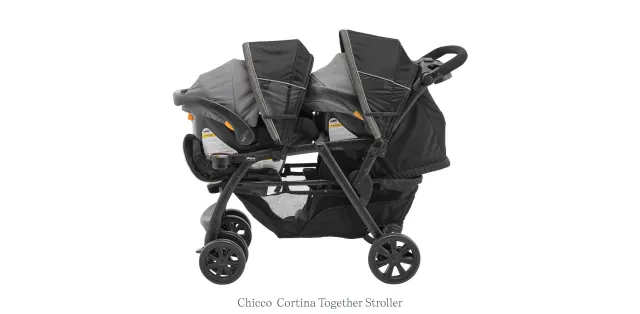There are not many things that ALL parents agree on. But, every parent will admit that the newborn stage is exceptionally challenging. Between feeding and sleep schedules and hormone shifts—there are a lot of big changes in your life when introducing a new baby. You may find yourself wondering, when will my newborn get easier? Even if you have a healthy delivery and quick recovery, the newborn stage may still feel overwhelming.
The good news is that this phase doesn’t last long, and with a little guidance and forethought, you can totally survive this difficult stage. So, today we’re sharing some milestones that mark easier days ahead for you and your family! As your baby ages and hits those developmental achievements, you’ll get closer and closer to your normal life again—with an adorable addition, of course.
When Does the Newborn Stage Get Easier
Those early weeks with a newborn are tough. Not only are you physically healing from your delivery, but you are probably sleep deprived as well! If you’re feeling totally overwhelmed by the day-to-day life with the care of a newborn, we promise there’s an end in sight. Here are some milestones that make the newborn stage much easier to cope with.
Get-to-Know-Me Phase
Your baby is a stranger. It’s true that you might know a little about them before they’re born, like their gender, size, and even their sleeping schedule, but you’re in the dark with a lot of things. In these early days, you’ll be developing a vital bond with your baby and learning all about their temperament, likes and dislikes, and particular needs.
You may discover your child likes to be bounced over rocked or that they have a cow’s milk allergy. Maybe they have a tongue tie or maybe they hate those bottles you bought. Maybe they prefer to be swaddled with their arms up. Or maybe they’ll take a pacifier, and maybe they won’t.
The point is, in these first few days, you’ll learn lots about your baby that will make the newborn stage much more manageable. You’ll know what products and techniques work best and spend a lot less time in trial and error, which means less time with a crying baby. Give yourself time to learn about your baby and soon, you will begin to see the light at the end of the tunnel!
Hormone Regulation
After your baby is born, your body goes through an intense hormonal shift that will take months to regulate. If you are feeling more sad and anxious than ever before, don’t worry. There is nothing wrong with you or your baby.
Postpartum hormonal changes can cause poor sleep, low appetite, depression, anxiety, and mood swings! And that’s just to name a few common symptoms. But, the good news is, you will not feel like this forever – we promise. After a couple weeks, the extreme feelings usually subside. At three months, you’ll see progress. And finally, at about six months, you’ll be totally back to normal.
If you’re in the middle of some serious baby blues, hold on tight. Your body is still finishing its pregnancy journey and will get back to normal soon.
Physical Healing
Of course, there is hormonal healing, but there is also physical healing! Right after you get home from the hospital, you might still be struggling to take care of yourself. It might be difficult for you to get around, lift baby, and even go to the bathroom. These physical factors definitely do not help the newborn struggle!
Once you physically heal, you’ll have more energy and speed. When baby is crying, you can rush to their aid! If you need to change a diaper on the floor, no problem! Give yourself some time to heal before you worry too much. Pushing yourself will only make things worse and stretch your healing time!
The healing time for a delivery varies on a few factors. A vaginal birth can take 3-6 weeks for full recovery, depending on tearing and whether you had an episiotomy. A c-section recovery can take 4-6 weeks as your incision heals. No matter what, birth is traumatic to the body. So, things will feel much easier once you’re physically back to normal!
Feeding Frustrations
Whether you’re using a bottle or breast, feeding your baby can be a struggle. If you’re breastfeeding, you’re navigating everything from getting the right latch to making a pumping routine. If you bottle feed, you’re trying to find a bottle that doesn’t cause spit-up and formula that doesn’t give baby gas. Either way, it’s stressful!
But, fortunately, it’s only stressful right at first. Once you have your routine, products, and techniques down, feeding will no longer frustrate you and your little one. This process doesn’t usually take very long, and once you figure it out, feeding is a cinch!
Day and Night Realization
When you’re pregnant, sometimes the sensation of movement during the day rocks baby to sleep. And when you lay down at night, they’re ready to party! This means that when they’re born, they can have their days and nights mixed up. If your baby has this confusion, you’re probably well aware and staying up all hours of the night while they explore, eat, and cuddle.
Luckily, with some blackout curtains, intentional playtime, and socialized day feedings, your baby’s circadian rhythms will regulate at about two weeks old. When this happens, you and baby can both get some much-needed shut-eye at night!
Baby Communication
Though it may sound silly, you might be thinking a little smile of appreciation would do wonders for your baby blues. The truth is, newborn babies don’t communicate with us much outside of their sad cries. Communication milestones like smiling, laughing, and babbling help make the newborn stage much more manageable!
At around two months of age your baby will develop a social smile. This social smile is a meaningful gesture of love and admiration! Additionally, your baby will laugh around four months and babble around six months! Each one of these communication milestones will bring you joy and relief during the turbulent newborn times.
Self-Soothing
Right now, you might feel you always have your baby attached to you. You might even contact nap because the idea of transferring to a crib just seems impossible. Your baby’s constant need for you can be super overwhelming and overstimulating.
Once babies start to self-soothe around 3-4 months, you will start to feel more like yourself. With a consistent sleep schedule and environment, your baby will sleep in longer stretches at night and take better naps during the day! This will give you time to nap, perform some self-care, or do some housework.
Sleeping Through the Night
One of the biggest milestones that gives parents peace during the newborn stage is when baby starts sleeping through the night, and you can get some uninterrupted sleep. Your baby can start sleeping through the night between 3-6 months, depending on whether or not you choose to do sleep training.
With this milestone and with them sleeping for a longer period, you’ll feel more energized, focused, and peaceful during the day! If you’re eager to get to this point, you can look into various sleep training methods to get the ball rolling a little faster!
Play and Movement
Though the sweet cuddles are always welcome, you are probably eager to get some time without a baby attached to your hip (or boob). Once your baby starts playing and moving around at around 6 months, they learn to entertain themselves, giving new mothers a much deserved break!
Not only does their independent play allow you some mommy time, but it also brings so much joy as they develop these exciting motor skills! Even if your baby is a little younger than 6 months, look into some engaging age-appropriate toys that will stimulate baby’s development and give you some hands-free time to yourself.
The Startle Reflex
Starting at around 2-4 months, you’ll see that pesky startle reflex fade away. Rather than your baby jumping in their sleep and needing to be soothed again, your baby will stay cozy and content. This means longer naps and longer sleep stretches!
Personality
Finally, one of the most wonderful and encouraging parts of the newborn stage is your child’s growing personality. As your bond knits closer, you will discover more and more about their unique selves. You’ll see glimmers of their personality around four months, which will bring delight, closer bonds, and excitement for the future!
How to Survive the Newborn Stage
So, now you know that easier days are coming in the near future! (Very near – just hold on a little longer!) But what about the feelings of anxiety and sadness you have right now? Just know, we hear you. Sometimes knowing things will get better doesn’t do much for your feelings today. To help you out, here are some tips for surviving the newborn stage:
Prepare.
If you haven’t had your baby yet, take time to prepare yourself for the next stage of life. Having a good plan in place will minimize opportunities for stress when baby comes home! Here are a few ways you can ready yourself for the newest addition:
Hire a car seat consultant.
One of the most unexpected frustrations about having a baby is figuring which car seat is best. Seriously! The whole reason Safe in the Seat was founded was to provide an educational car seat resource for moms just like you!
A great way to take the headache out of choosing, installing, buckling, and cleaning your car seats is to purchase our infant car seat bundle and hire a consultant! We’ll take you through every step of the process and ensure you’re completely equipped to strap baby in safely with the perfect car seat choice!
In this sample lesson from our Infant Course you will learn the different types of installation methods for your infant car seat. Whether you are starting your journey on Team Base or Team No-base, in this lesson you’ll learn about all the possible infant car seat installation methods and how to connect your car seat to a vehicle. Want to learn how to keep your child safe on every ride? Check out our Infant Course on the how-tos of installation, harnessing and troubleshooting.
Make freezer meals or a meal train.
Making meals will be tough with a new baby. As you navigate the challenges we discussed above, preparing a good meal will be far from your mind! Before baby comes, either make a week of freezer meals or set up a meal train! Freezer meals cook quickly in the oven or crock pot, and a meal train with friends, family, and community members means food delivery right to your door! Imagine home-cooked DoorDash!
Lower your expectations.
It’s good to realize now, before baby is born, that things will not stay the same. You won’t shower as often, your house won’t stay as clean, and you might not make all your commitments. That’s okay!
During the newborn stage, it’s wise to lower those expectations. This will keep you from getting frustrated by the mess and your impossible to do list. We do understand maintaining your house is important to you, though. So, be sure to check out our quick cleaning tips for busy moms for a little house-keeping inspiration!
Make a plan with experts (other moms).
You might have all sorts of great ideas for your newborn set up before baby is born – and that is great! But, it’s always a good idea to workshop that plan with the experts: other moms! Other parents will be able to see potential flaws in your plan and save you the learning curve.
Sure, a beautiful stocked changing table on the third floor sounds like a great idea – but have you considered a station on the first floor? What about adding a change of clothes to your diaper bag? Maybe buying formula in bulk isn’t a good idea since you won’t know what your baby will like? This is all advice your mom-friends will be happy to give and that will save you so many headaches later.
Connect with a therapist.
Finally, before baby, it is a good idea to connect with a therapist. This might seem strange, but think about it: When you are in the midst of postpartum depression, do you think you’ll want to research and find a good therapist? Probably not! Make the connection now, so when you need some help, the line is already open!
Do regular mental health checks.
To survive the newborn stage, it’s important to keep tabs on your mental health. As we discussed earlier, mood changes due to hormonal shifts are normal. But, when these feelings of sadness escalate, you and your family could be in danger.
Postpartum depression and anxiety are very serious. If you have thoughts of suicide or self-harm, or simply can’t shake your feeling of hopelessness, seek help! Use this resource to do regular mental health check-ins and call your OBGYN or therapist if you think you might be experiencing postpartum depression or anxiety.
If your symptoms don’t point to postpartum depression, but you’re still stressed and unfulfilled, we have a resource for you too. For some relief, read our article on tips for overwhelmed moms and put some of our principles to practice right away.
Ask for help directly.
No one says you need to do this whole baby thing alone. When you need help, don’t hesitate to ask for it. Make sure you directly ask for it to avoid the dreaded, “Let me know if you need anything” line. Whether you need help from your husband, a family member, or friend, be clear about exactly the help you need and when.
If you don’t have a support network that can bring you a meal or babysit for a couple of hours, hire someone! There is no shame in having someone clean the house or watch baby while you nap!
Choose rest over housework.
As a new mother, you are most likely sleep deprived. And, unfortunately, lack of sleep can cause mood and concentration issues. This can make having a newborn even more stressful! Though the house might not be as tidy as it was before baby, lower your expectations, and catch up on sleep when you have the chance.
Realize it’s okay to not like this stage.
Many moms feel tons of guilt when they don’t like the newborn stage. But, how many times have you heard someone say they hate “the terrible twos” or the teenage years? The point is, it’s normal to not like a stage of development, including the newborn stage. It doesn’t diminish your love for your child and you have no reason to feel shame!
Perform maintenance on your marriage.
Both you and your spouse will be affected by this new stage, regardless of where the responsibilities fall. As you focus on your baby, it can be easy to disconnect from your spouse. When this happens, the level of stress and chaos can increase as you struggle to support one another through a mutually difficult time!
Maintaining your marriage could be as simple as prioritizing weekly dates or as involved as couples’ therapy. Either way, don’t forget that this important relationship needs attention too as you endure the newborn phase.
Take a longer maternity leave.
Depending on where you live, your work situation, and your health, your maternity leave will probably be over before your baby is out of the newborn stage. Going back to work too soon can make the stress of this phase worse and increase your anxiety. If you have the means, try to take a longer maternity leave than you originally planned.
Pivot. There’s no shame!
You might have planned to breastfeed, cloth diaper, and go screen-free. We’re here to tell you that if things get tough and it’s just not working out, there is no shame in pivoting! Fed babies are loved babies. Cloth diapers sell great online. And as for the screens? Well, a few cartoons won’t doom your child.
Switch up your plan and find what works. Don’t let pride get in the way of your peace and sanity.
Find hands-free ways to invest in yourself.
Many new moms feel like they lose their identity during motherhood. And sometimes, it can get harder and harder to see who you are beyond a mother. A great way to feel fulfilled and empowered is to find at least 15 minutes a day to invest in yourself.
We know your hands will be full often. So, maybe you could listen to an audiobook or podcast, or journal using voice-to-text. You could meditate or pray, watch how-to videos, or even call a friend on the phone. Do a little self-care and remember that you are both a mom and your own person.
Step back into a life of joy and peace with our helpful tips and upcoming milestones!
The newborn stage is not easy – everyone agrees with that! But, the newborn phase doesn’t have to be miserable and overwhelming. Remember, this stage doesn’t last long and with each milestone, it’ll get easier and easier. And, when you implement our helpful tips, you’ll find harmony in your house despite the chaos of a newborn. We believe in you, and we know you can get through this!
Affiliate links are included above. Safe in the Seat earns a small commission when you purchase through these links with no cost to you. We so appreciate your support.





